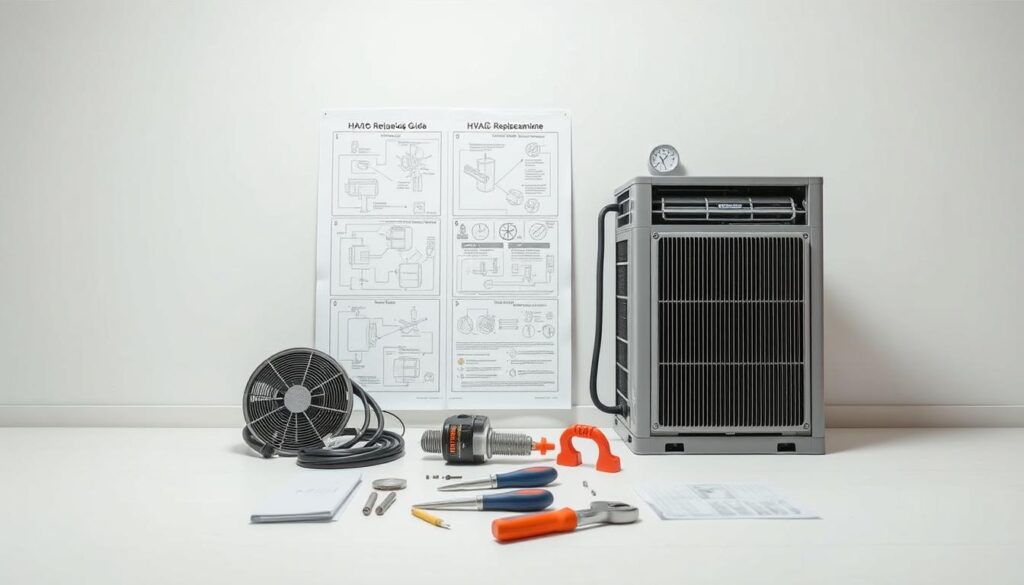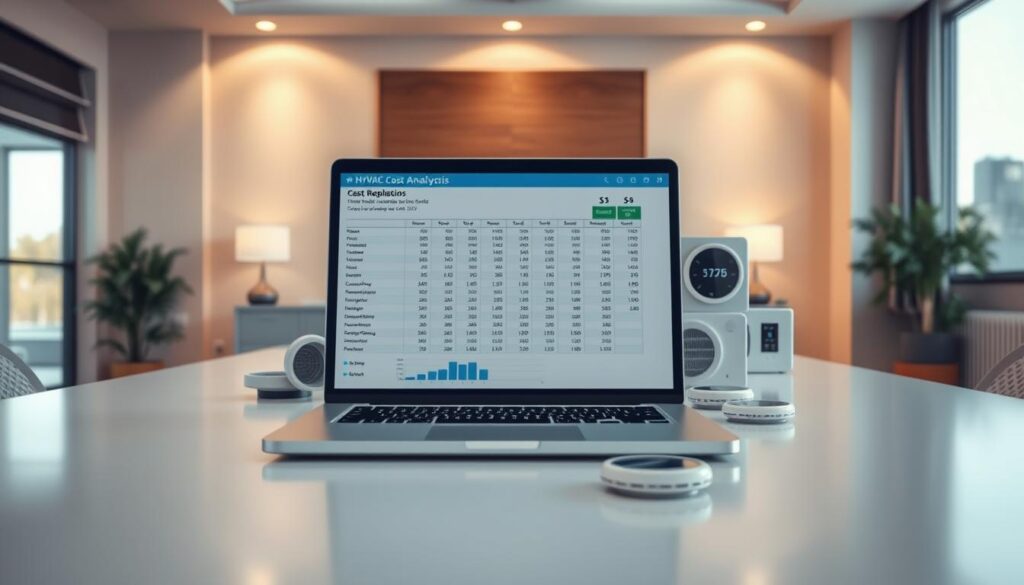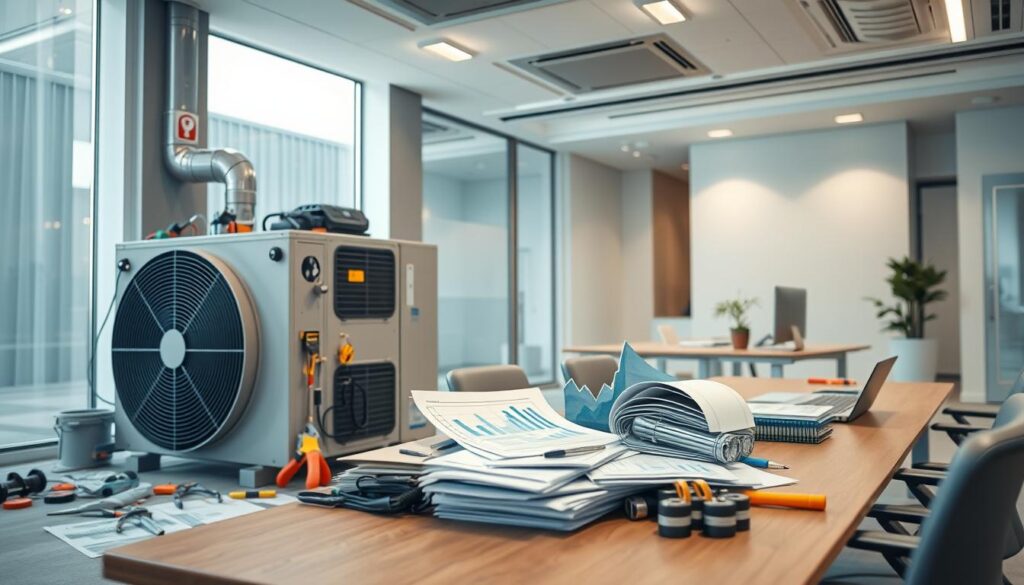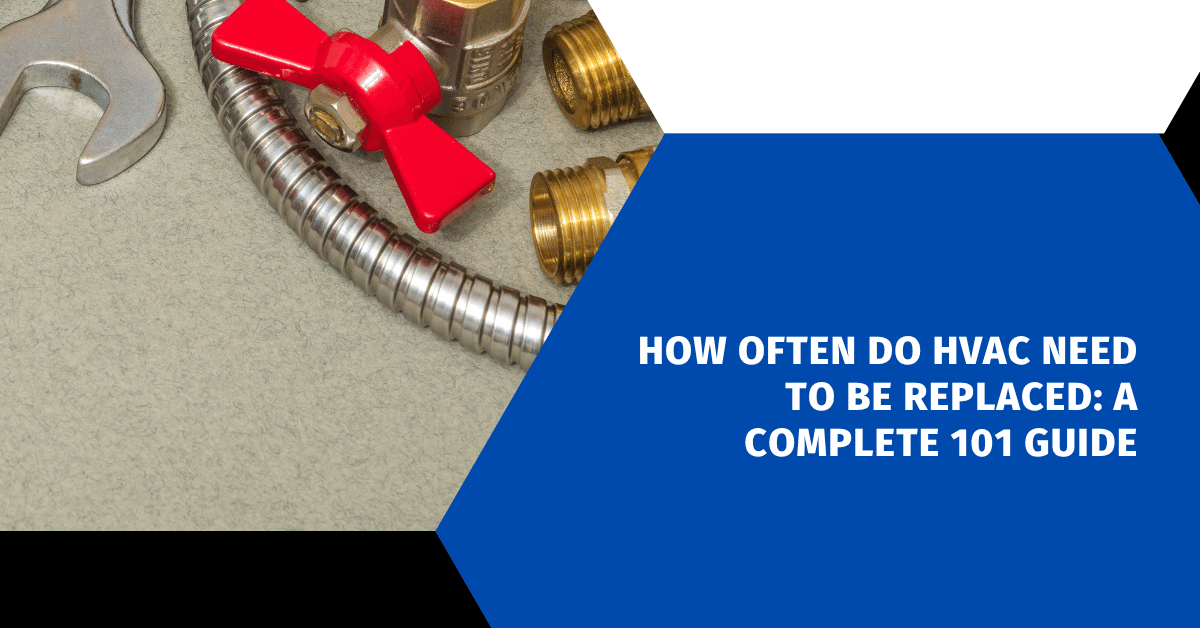Affiliate Disclosure
HVAC Guide Guys is a participant in the Amazon Services LLC Associates Program, an affiliate advertising program designed to provide a means for sites to earn advertising fees by advertising and linking to Amazon.
How Often Do HVAC Need To Be Replaced? Are you wondering when your home’s heating and cooling system might need a critical upgrade? Most homeowners don’t realize that knowing how often HVAC systems need to be replaced can save thousands in unexpected repair costs and energy inefficiencies.

Understanding your HVAC replacement schedule is more than just tracking age. It’s about recognizing performance, efficiency, and long-term savings. Modern HVAC systems usually last 10-20 years. But, many factors can affect their actual lifespan.
This guide will help you understand when and why you might need to replace your HVAC system. We’ll look at key signs that it’s time for a new one. And we’ll help you make smart choices for your home’s comfort and energy use.
Key Takeaways
- HVAC systems typically last between 10-20 years
- Regular maintenance can extend system performance
- Energy efficiency improves with newer HVAC models
- Replacement costs vary based on system type and home size
- Professional assessment helps determine optimal replacement timing
Table of Contents
Understanding HVAC Systems and Their Lifespan
Your HVAC system is key to home comfort. Knowing about hvac system lifespan helps you make smart choices. Different systems have their own durability and performance levels.
Today’s HVAC systems vary, each with its own lifespan. Learning about these types can help you extend your system’s life and boost its efficiency.
Common HVAC System Types
- Central Air Conditioning Units: 10-15 years typical lifespan
- Furnaces: 15-20 years average duration
- Heat Pumps: 10-15 years operational period
- Ductless Mini-Split Systems: 12-15 years expected life
Critical Factors Influencing System Longevity
Several key elements determine your HVAC system’s lifespan:
- Installation Quality: Professional installation greatly affects long-term performance
- Usage Intensity: How often and how long you use the system
- Environmental Conditions: Your local climate and air quality
- Maintenance Practices: Regular inspections and care by professionals
Maintenance: The Key to Longevity
Regular maintenance is vital for extending hvac life. Professional tune-ups catch issues early, saving on repairs. Bi-annual inspections keep your system running smoothly and prevent early failure.
Proactive maintenance can extend your HVAC system’s life by 30-50%.
Signs Your HVAC System Needs Replacement
Knowing when to replace your HVAC system can save you money and prevent unexpected breakdowns. It’s important to recognize the signs to keep your home comfortable and efficient.
Your HVAC system gives clear signals when it’s struggling. Frequent repairs are often the first sign. If you’re calling technicians multiple times a year, it might be time for a new system.
- Increasing energy bills
- Inconsistent room temperatures
- Unusual noises or strange odors
- System age over 10-15 years
Energy efficiency drops with aging systems. An older HVAC unit can consume 30-50% more energy than a modern system. This means higher utility costs for you.
| Sign | Potential Action |
|---|---|
| Repairs cost more than 50% of new system | Consider full replacement |
| System over 15 years old | Plan for replacement |
| Inconsistent cooling/heating | Evaluate system performance |
When deciding between repair and replacement, consider the system’s age, repair frequency, and performance. A professional HVAC technician can help you make the right choice.
Explore Our HVAC Shop
Looking for top-rated HVAC tools, parts, and accessories? Visit our shop and find the perfect solution for your needs.
Visit the ShopHow Often Do HVAC Need To Be Replaced
Knowing when to replace your HVAC system is key for comfort and saving energy. The timing for replacement varies. It depends on several factors that affect how well your system works and lasts.
Most HVAC systems last 10 to 20 years. Your exact time frame depends on a few important things:
- System type and quality
- Maintenance habits
- Local weather
- How much you use it
Age-Based Replacement Guidelines
Age is a big factor in deciding when to replace your HVAC. But, it’s not the only one. Different parts of your system last different lengths of time:
- Central air conditioners: 10-15 years
- Furnaces: 15-20 years
- Heat pumps: 10-15 years
Performance-Based Replacement Indicators
Watch out for these signs that your HVAC might need to be replaced:
- Higher energy bills
- Constant repairs
- Uneven temperatures
- Odd noises or smells
“An aging HVAC system can cost you more in repairs and energy inefficiency than a timely replacement.” – HVAC Industry Expert
Cost-Efficiency Considerations
Think about long-term savings when deciding when to replace your HVAC. A new, efficient system might cost more upfront. But, it can save you money on bills and make your home more comfortable.
Getting advice from a professional HVAC technician can help you choose the best time for replacement.
HVAC Replacement Costs and Considerations

Knowing the cost to replace your HVAC system is key for homeowners looking to upgrade. The cost can range from $2,500 to $10,000. This depends on several important factors.
When looking at energy-efficient HVAC replacements, consider a few key points:
- System type and size
- Home square footage
- Installation complexity
- Local labor rates
- Energy efficiency ratings
The cost of your new HVAC system will depend on what you choose. High-efficiency models might cost more upfront but save you money in the long run.
To keep costs down, try these tips:
- Get quotes from different professionals
- Look for rebates from manufacturers
- Check out local energy-saving incentives
- Explore financing options
Choosing an energy-efficient HVAC can cut your yearly heating and cooling costs by 20-40%. A modern, efficient system is good for the planet and your wallet.
“Smart homeowners view HVAC replacement as a long-term investment, not just an expense.” – HVAC Industry Expert
Explore Our HVAC Shop
Looking for top-rated HVAC tools, parts, and accessories? Visit our shop and find the perfect solution for your needs.
Visit the ShopEssential HVAC Maintenance Schedule
Keeping your HVAC system in top shape needs regular care. It’s key to extend its life and avoid expensive repairs. A well-planned maintenance routine ensures your heating and cooling system works best.
Using the right hvac maintenance tips can greatly improve your system’s life and performance. Let’s look at the main maintenance strategies to protect your investment.
Seasonal Maintenance Tasks
Each season brings its own challenges for your HVAC system. Here’s a list of must-do maintenance tasks:
- Spring: Clean outdoor units, check refrigerant levels, inspect ductwork
- Summer: Test cooling performance, lubricate moving parts, clean air registers
- Fall: Prepare heating system, seal air leaks, check thermostat calibration
- Winter: Inspect heat exchanger, clean burners, test safety controls
Professional vs DIY Maintenance
Some maintenance tasks are easy for homeowners to do. But, professional inspections are vital for thorough system care. Here’s what to keep in mind:
- DIY tasks: Changing filters, cleaning vents, checking visible components
- Professional services: Annual system check, complex repairs, handling refrigerant
Filter Replacement Guidelines
Filter care is essential for your HVAC system’s health. Follow these tips:
- Standard filters: Replace every 90 days
- Homes with pets: Replace every 60 days
- Homes with allergies: Replace every 30-45 days
Being proactive with HVAC maintenance boosts efficiency, cuts energy costs, and prevents sudden failures.
Explore Our HVAC Shop
Looking for top-rated HVAC tools, parts, and accessories? Visit our shop and find the perfect solution for your needs.
Visit the ShopEnergy Efficiency and Modern HVAC Systems
Modern HVAC systems have changed how we enjoy our homes. They make our homes more comfortable and help us save energy. When you look into getting a new, energy-saving HVAC system, you’ll find amazing technologies.
These systems bring big benefits:
- Higher SEER2 ratings for maximum energy efficiency
- Smart thermostat integration
- Reduced carbon footprint
- Significant long-term cost savings
Smart technologies now let you control your home’s temperature better. They can even learn your habits and adjust settings for you.
“Upgrading to an energy-efficient HVAC system is not just about comfort—it’s an investment in your home’s future.” – Energy Efficiency Experts
Features like variable-speed compressors and zoned heating/cooling offer great control. These innovations help you save energy by not heating or cooling unused areas. This cuts down your utility bills and helps the environment.
When you’re ready to upgrade, look for systems with ENERGY STAR certification. These models are 15% more efficient than standard ones. This means big savings over time.
Professional Installation and Replacement Process
Replacing your HVAC system is a big deal. It needs careful planning and expert help. The right way to replace your HVAC ensures your home stays comfortable for years.
Finding the right time and professional for the job is key. It’s more than just putting in new parts.
Choosing a Qualified Contractor
Choosing the right HVAC pro is essential. Look for someone with:
- Proper licensing and certifications
- Years of experience
- Good customer reviews
- Clear pricing
“A skilled contractor turns HVAC replacement into a smooth home upgrade.”
Installation Timeline and Requirements
The HVAC replacement process has several important steps:
- First, a home check
- Choosing the right equipment
- Removing the old system
- Installing the new one
- Testing and adjusting the system
Post-Installation Checks
After it’s installed, expect a thorough check. A pro will make sure:
- The system works right
- Refrigerant levels are correct
- Air flows well
- Electrical connections are good
Professional installation saves you money and ensures your HVAC works its best.
Explore Our HVAC Shop
Looking for top-rated HVAC tools, parts, and accessories? Visit our shop and find the perfect solution for your needs.
Visit the ShopMaximizing Your HVAC Investment

Keeping your HVAC system in top shape is key to making it last longer and work better. Smart homeowners know that regular maintenance can turn a basic heating and cooling system into a reliable and efficient one.
Using good hvac maintenance tips can cut down on unexpected breakdowns and expensive fixes. How you take care of your system affects how long it lasts and how well it works.
- Schedule professional inspections twice annually
- Replace air filters every 3-4 months
- Keep outdoor units clean and unobstructed
- Monitor system performance regularly
Think about making a detailed maintenance plan that covers both preventing problems and upgrading your system. This way, you can stay ahead of issues and keep your system running smoothly.
| Maintenance Action | Frequency | Expected Benefit |
|---|---|---|
| Professional Tune-up | Biannual | Extends system life by 30-40% |
| Filter Replacement | Every 3-4 months | Improves air quality and efficiency |
| Ductwork Inspection | Annually | Prevents energy loss |
Investing in your HVAC system is not just an expense. It’s a smart choice that brings many benefits, like better comfort, saving on energy, and longer equipment life.
By sticking to these tips, you can safeguard your investment, lower long-term costs, and make sure your HVAC system runs at its best for many years.
Conclusion
Knowing when to replace your HVAC system is key to a comfy home. Your HVAC is a big investment. Knowing when to fix or replace it can save you a lot of money and avoid sudden breakdowns.
Regular checks help you decide between fixing or replacing your HVAC. Look out for signs like high energy bills, lots of repairs, and uneven temperatures. These signs mean it might be time for a new, more efficient system.
Getting expert advice is important when replacing your HVAC. Experts say to check your system’s performance, age, and condition every 10-15 years. Regular maintenance can make your system last longer and work better all year.
Don’t wait, book a professional check-up for your HVAC today. Spending time and money on maintenance helps you make the right choices about replacements. This keeps your home comfortable and your wallet happy.

